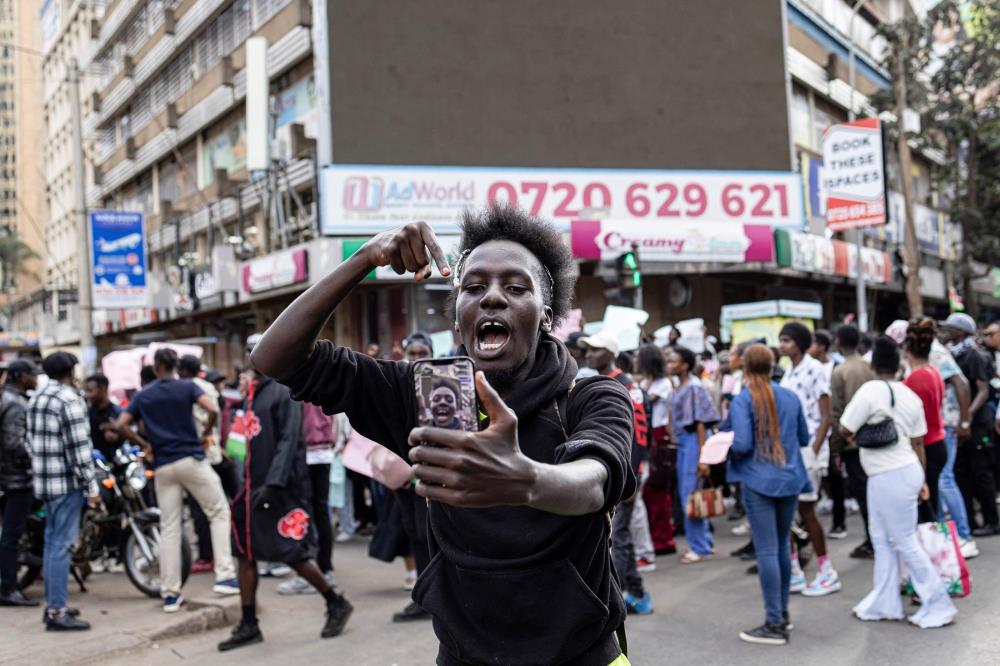
Filming Tiktoks In Tear Gas: Kenya's Gen-Z Protesters
Nairobi: Growing up in a shanty town in Kenya's capital Nairobi, Sarah Njoroge saw her parents ban her older siblings from taking part in anti-government demonstrations, fearing the bloody crackdown that would follow.
But the 21-year-old spent two days last week dodging clouds of tear gas and water cannon -- smartphone in hand -- instead of attending her psychology class.
She is part of a mostly Gen-Z, hashtag-savvy crowd that has flooded streets across Kenya, bringing together thousands of youth from different social classes united in their opposition to proposed tax hikes.
Many said they wanted to challenge the cliche that their generation is apolitical as they gear up for a national strike on Tuesday.
Some have already paid a huge price -- with at least two deaths and dozens wounded, according to rights campaigners.
A police watchdog said on Friday it was investigating allegations that a 29-year-old man was shot by officers in Nairobi after the demonstrations.
"I did not need my mother's permission to come here," Njoroge told AFP, dressed in ripped jeans and black trainers, in an alleyway emblazoned with graffiti about corruption -- a hot-button issue in the country.
"Even so, her refusal would mean she is in bed with our oppressors."
The movement started on social media -- as furious TikToks amassed thousands of views -- and snowballed into protests in Nairobi, which then spread nationwide.
"They instilled a lot of fear in our parents and we don't want to inherit that," 19-year-old international relations student Jeremy Mwangi told AFP.
"We want to stand up for ourselves, we want to determine our future."
'Cool kids'
The government's initial dismissal of the movement as "clueless" protests by "cool kids" is now being put to the test, with President William Ruto saying on Sunday that he was ready for talks with the protesters.
"I am very proud of our young people... and I want to tell them we are going to engage them," Ruto said, hailing the demonstrations for being "peaceful".
But protest organiser Hanifa Adan said Ruto needed to "respond publicly" to their demands calling for the hikes to be cancelled.
"President Ruto can't claim to support us while his police brutalise peaceful protesters," she told AFP, adding that she was in hiding to avoid arrest.
Kenya has a long history of protest, with demonstrators facing arrests and police violence during their struggle for multi-party democracy in the 1980s and 1990s.
But subsequent decades saw rallies characterised by paid crowds, with leaders keen to give the impression they could draw a spontaneous and adoring following.
'Raise hope, not tear gas'
Things look very different this time.
Armed with smartphones, and often livestreaming their protests, the demonstrators have won fans online with their colourful, witty and occasionally explicit signs.
"Raise hope, not tear gas," read one placard last week, with another declaring: "It's not tear gas, it's the fragrance of change."
The government has made some concessions but vowed to push ahead with other tax increases.
Despite angry calls for Ruto's resignation, the protests have remained largely peaceful -- devoid of the vandalism and looting that became synonymous with previous political rallies.
Demonstrators have also trained their livestreams on police officers, who have a history of using sometimes lethal force against civilians.
'Ripe for revolution'
Kenya is one of the most dynamic economies in East Africa. Yet more than a third of its roughly 52 million people lives in poverty, according to government figures.
Ruto said Sunday that the annual budget included measures to tackle youth unemployment and improve access to higher education.
But promises may not be enough.
"Kenya is ripe for a revolution," political analyst Macharia Gaitho wrote in the leading Daily Nation newspaper.
He warned that the movement could "shake the foundations of a state that doesn't listen to the people or care about their concerns."
"It is easy to express anger on X and TikTok, but quite another to come out in numbers braving police truncheons, tear gas, water cannons and bullets."
Millennials are also protesting alongside Gen-Z, with 37-year-old Sheila Olang' saying she felt compelled to join her younger compatriots.
"There's nothing more powerful than when a revolution is at a grassroots level," she told AFP.

Legal Disclaimer:
MENAFN provides the
information “as is” without warranty of any kind. We do not accept
any responsibility or liability for the accuracy, content, images,
videos, licenses, completeness, legality, or reliability of the information
contained in this article. If you have any complaints or copyright
issues related to this article, kindly contact the provider above.

















Comments
No comment